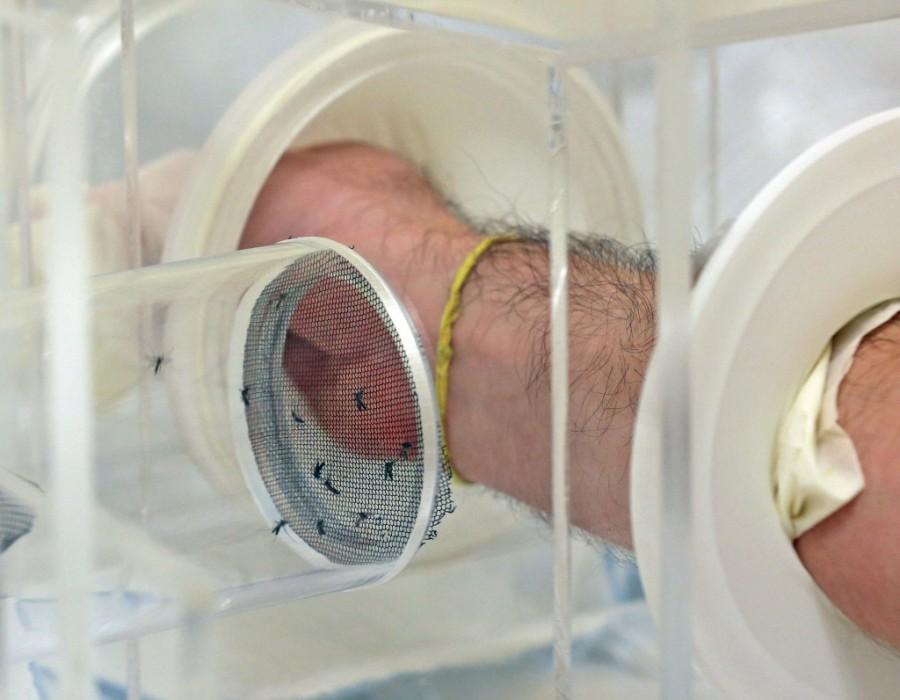The Zika Virus: A Growing Epidemic in Central and South America
Concerns grow as Olympics Loom
Florida International University’s Matthew DeGannaro holds his arm in a test to watch the mosquitoes attraction to the human scent in his research to help combat the Zika virus that is transmitted by the mosquito, on February 10, 2016, in Miami. (Charles Trainor Jr./Miami Herald/TNS)
In October 2015, Brazil was forced to declare a state of emergency because of an outbreak of a dangerous virus that few people had heard of. According to CBC news, over 2,700 babies were born with microcephaly: a disease in which unborn babies are born with an abnormally small head due to incomplete brain development.
The virus was later identified as the Zika virus, which was first detected in 1947 in a rhesus monkey living in Uganda. In 1948 the mosquito Aedes aegypti was identified to be carrying the virus. This species of mosquito has the dangerous potential of spreading the virus to humans. In 1952, the first human case of the Zika virus erupted in Nigeria, and in 2007 an entire population of people living on the Pacific Island nation of Micronesia was affected. However, the virus did not draw public attention until its rapid outbreak in Brazil in 2015.
The Zika virus is so detrimental because most people do not exhibit explicit symptoms that let them know something is seriously wrong. According to the CDC (Centers for Disease Control and Prevention), symptoms include fever, rash, joint pain, muscle pain, headache and conjunctivitis (red eyes). Such symptoms are often neglected, because they are the same as the ones from normal viruses that cause harmless colds and fevers. Doctors diagnose the Zika virus through blood tests. However, there is unfortunately no current vaccination that can prevent or treat the disease. Therefore, the symptoms can only be treated through drinking lots of water, getting plenty of rest, and by taking medicine such as acetaminophen to reduce the fever and pain.
Microcephaly, eye defects, hearing deficiency and impaired growth are all devastating effects caused by the Zika virus. The virus has also be linked to miscarriages. Thais Battistot, the mother of a child diagnosed with microcephaly, shared her story with The Independent newspaper in the United Kingdom. Her daughter Emanuelle was diagnosed at seven-months-old, and now suffers motor neurone problems. Battistot knew something was seriously wrong when she realized Emanuelle was not developing skills, such as sitting up or moving around, like her nephew of the same age. Emanuelle’s microcephaly was unknown for quite sometime because the disease did not impact the size of her head. Despite her initial shock and sorrow, Battistot has now joined many other affected mothers in Brazil to form a support group called Maes de Anjos Unidas (United Mothers of Angels).
The United States and Canada have urged pregnant women to reschedule their travel commitments to South American countries for the time being. Despite the precautionary measures, the CDC has released information that from 2015 to 2016, 273 people were infected with the Zika virus in the U.S., and of those, 19 were pregnant women.
With numerous amounts of people affected by the Zika Virus, Brazil has tried to develop preventive measures that could reduce the number of victims. According to BBC News, Brazil was ready to deploy 220,000 soldiers to fight against the mosquitoes spreading the virus. Although the numbers of infected people are high now, there is still hope that they will fall before the Summer Olympics begin this summer in Rio de Janeiro. Brazilian officials have promised to drastically increase their efforts in keeping mosquitoes away during the event.

Nivetha is a member of the Class of 2018. After contributing "A Journey into the World of 3-D Printing" during her freshman year, she joined the staff...


